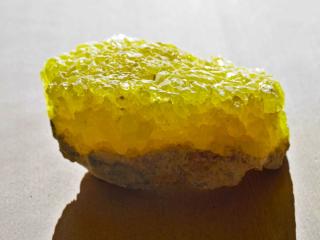

Just like copper, sulfur (S) is a treatment product permitted in organic farming. Used for millennia, it’s a natural product that serves as both fungicide and acaricide. You can also use it as fertilizer, amendment, or repellent against some pests. You handle sulfur with care in its powder or micro-granule forms, respecting the dosages indicated on the packaging.
 Sulfur is a naturally occurring mineral that forms around volcanoes during periods of inactivity. It’s a simple substance denoted by the letter S in the periodic chemical table. We extract it from volcanic rocks, distill it, and refine it. This process removes any earth and impurities mixed with it. We thus get sulfur in various forms.
Sulfur is a naturally occurring mineral that forms around volcanoes during periods of inactivity. It’s a simple substance denoted by the letter S in the periodic chemical table. We extract it from volcanic rocks, distill it, and refine it. This process removes any earth and impurities mixed with it. We thus get sulfur in various forms.
Sulfur acts by sublimation. That means, it turns into gas on contact with plants. It emits a sulfuric vapor that penetrates inside pathogenic fungi and disrupts their development. Fungi growth is hindered, and even stopped. In fact, sulfur kills the germinative tube of fungi without penetrating plant tissues.
Even though organic farming permits sulfur, you should use it sparingly. Despite its natural nature, sulfur remains a treatment and can impact the environment. It carries a degree of ecotoxicity. Among other things, it is toxic to Anthocorids, a family of predator insects which includes bugs whose larvae feed on aphids and mites.
In garden centers, sulfur comes in two forms:
Sulfur sublimation requires specific weather conditions to be fully effective: it is not very effective at a temperature below 50 °F (10 °C) and, beyond 80 °F (27 °C), it can burn the foliage. Ideally, spray sulfur on a bright, sunny day (not too cloudy) with a temperature between 73 and 77 °F (23 to 25 °C).
The effectiveness of sulfur lasts for a week. So, it’s essential to repeat the treatment, but without overdosing it because sulfur has an acidifying effect on soils.
The main use of sulfur is as a fungicide, meaning that it fights preventively (and also curatively) against the growth of fungi, and therefore key common fungal diseases such as:
It is essential to strictly follow the right dosage as written on the packaging. You can also mix sulfur with Bordeaux mixture (for example to treat potato blight or black spots on rose bushes). In specialized shops, you can find products that combine 20 or 30% sulfur with helpful powdered plants like nettle, horsetail, allium, and algae, and/or rock powders.
Sulfur can also have a miticidal action against red spiders (which are indeed mites!) or the pearleaf blister mite and other blister mites on hazel and tomato. It also works against certain pest insects such as stink bugs and ants.
Sulfur also serves as a fertilizer and mineral amendment. It is used as a fertilizer for vegetable plants and fruit trees that lack it. This lack is characterized by the yellowing of leaves.
As an amendment, it helps acidify soil that has too much lime.
 Wearing gloves, glasses and a mask is highly recommended during spraying
Wearing gloves, glasses and a mask is highly recommended during spraying→ To go further: